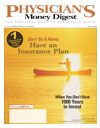Publication
Article
Physician's Money Digest
Protect Your Most Valuable Asset: Identity
Author(s):
We all go to tremendous lengths to protectwhat is ours. We install sirens in ourhomes to frighten intruders. We set upalarm systems in our cars to scare off robbers. But alltoo often, we neglect to take steps to protect ouridentities—our most valuable asset.
A Personal Intrusion
Identity theft is becoming more common today aswe exchange personal information in the mail, overthe phone, and via the Internet. Physicians, while notat any greater risk than the general public, may seemlike more appealing targets because of their higherincomes and good credit status. If you own a practice,you may be especially vulnerable to this white-collarfraud when dealing with health care billing and paymentsystems. Working at a hospital doesn't protectyou either—you need to know how your personalinformation is handled in hospital and insurer records.
Providing more opportunities for a potential identitythief, physicians often share financial matterswith outside people like accountants or bookkeepers,who may or may not be able to distinguish betweenvalid and fraudulent charges.
Maintaining control and ownership over youridentity is as much a part of your financial well-beingas staying debt free and purchasing appropriate lifeand disability insurance policies. Just like positioningthose motion detectors and panic buttons in yourhome and car, there are simple, strategic ways tominimize the risk of someone stealing your identity.
Steps You Can Take
•Order a credit report from each of the threemajor credit bureaus: Equifax (800-685-1111 or equifax.com), Experian (888-397-3742 or experian.com),and TransUnion (800-916-8800 or transunion.com).
•Shred materials that contain your personalinformation (eg, account numbers, passwords, birthdates, and Social Security numbers).
•When sharing sensitive information over theInternet, check for "https" at the beginning of theURL—the "s" indicates a secure site.
•Do not provide your Social Security number tocompanies that do not need it. When supplying personalinformation, find out how it is being used first.
•Avoid using easily guessed passwords, such asyour mother's maiden name or your birth date.Change passwords often.
•Stay alert of billing cycles and inquire aboutbills that do not arrive on time.
•Retrieve your mail when it arrives to preventtheft of correspondence containing private records.Use public mailboxes instead of home boxes to sendmail with personal data.
Following these guidelines will certainly minimizeyour risks, but there is no sure-fire way to prevent anidentity break in. If you do have an identity theft crisis,report the crime to one of the major creditbureaus, which will notify the other two agencies.Ask the bureau to place a fraud alert on your file andrequest a notification if new accounts are opened.
Identity theft may not be as obvious as a homeinvasion, but it can be even more tumultuous to completelyrectify. Protect your name and guard yourcredit. Put an alarm on your identity.
Katherine B. Paal, MBA, CFP®, RFC, CTFA, is a Certified FinancialPlanner™practitioner at Heritage Financial Consultants inLutherville, Md, and is an investment advisor representative,registered representative, and licensed insurance broker withLincoln Financial Advisors, a registered investment advisor andbroker-dealer (1300 York Road, Lutherville, Md; 410-339-6675). She welcomesquestions or comments at kpaal@LNC.com. This information should not be construedas legal or tax advice. You may want to consult a tax advisor regarding thismaterial as it relates to your personal circumstances.
